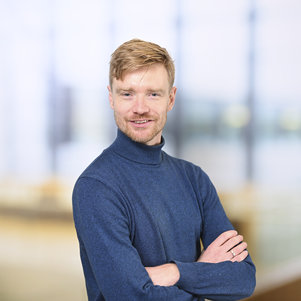Cees Haringa Group
What is it like to be a microbe? How do you perceive the environment? And how are you influenced by said environment? These questions are at the heart of my research: the study of (industrial) bioprocesses from the microbial perspective.
My group focuses on fermentation, starting from the perspective of large-scale operations. What kind of conditions (and gradients therein) do organisms encounter in large-scale fermentor and how do cells respond to these conditions. To this end, we focus on the use of lifelines – the fluctuations in their external environment that cells perceive during their lifetime inside a bioreactor. In the end, our aim is to improve process performance by optimizing the process (equipment/operating conditions) as well as the microbe (robustness towards industrial conditions).
We focus on the development of tools and models to get more insight in industrial fermentation processes, in particular the following:
- Computational fluid dynamics (CFD) for bioprocesses: we make heavy use of CFD to gain insight into industrial-scale fermentations. We mainly focus on the implementation of microbial models in CFD simulations and using Euler-Lagrange CFD simulations to collect lifelines. We are furthermore interested in the use of these models (process improvement, scale-down guidance) as well as improvement of the hydrodynamic description (gas-phase behavior, rheology, …)
- Downscaling from the microbial perspective: we are interested in translating the lifelines collected with the simulations above to representative scale-down simulators, assessing the microbial response in said simulators, and translating results back to metabolic models for usage in process simulations. Our interests range from ‘classical’ bench-scale downscaling as well as novel micro-downscaling approaches.
- Coarse-grained simulations: how can we create simulations that sufficiently represent industrial-scale environments, while being computationally tractable? What is required for a proper ‘digital twin’ of an industrial bioprocess? We are interested in both mechanistic and data-driven approaches.
Collaborations
Our research interests link to a broad range of competences and topics that are outside of our core expertise. In addition, our interests link strongly to the industrial context and practical challenges encountered in the biotechnological industry. As such, we are very open to exploring both industrial and academic collaborations. Do you have questions, ideas or expertise (potentially) related to my research interests? Let's get in touch! I’m always open to have a (virtual) discussion and see where our interests meet.
Teaching
I am highly passionate about teaching, in particular about establishing a connection between timely research topics and education and the inclusion of sustainability in education. Education is not just a matter of transferring information, but also about engaging and enabling students to pursue their passions. Other topics that interest me in the context of education are: virtual labs/plants (digital twins) for practical education, blended learning, balancing academic freedom with training industry-ready engineers, and engaging with societal relevance. Do you want to chat about these topics – either with concrete ideas, or more on a conceptual/philosophical level? Send me a message!
About me
Originally from a beautiful, little island called Terschelling, in the North of the Netherlands, I am a chemical engineer with a strong passion for creating a sustainable process industry. I hold a BSc and MSc degree from TU Delft in chemical engineering. These were followed by a PhD (with honors) on CFD simulation of industrial fermentation systems, for which I was awarded the inaugural DECHEMA industrial bioprocess award. I worked as a CFD scientist in the DSM biotechnology center from 2017-2020, applying the knowledge I acquired in my PhD in industrial practice. Since 2021, I work as an assistant professor in the bioprocess engineering group at TU Delft.
